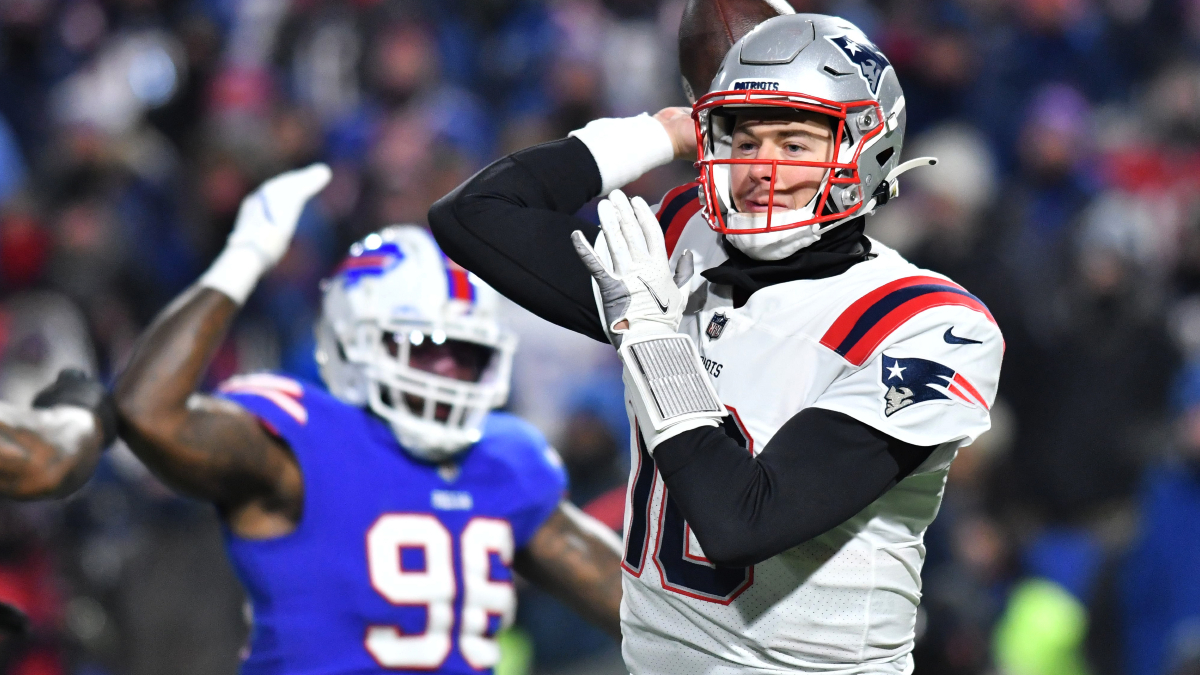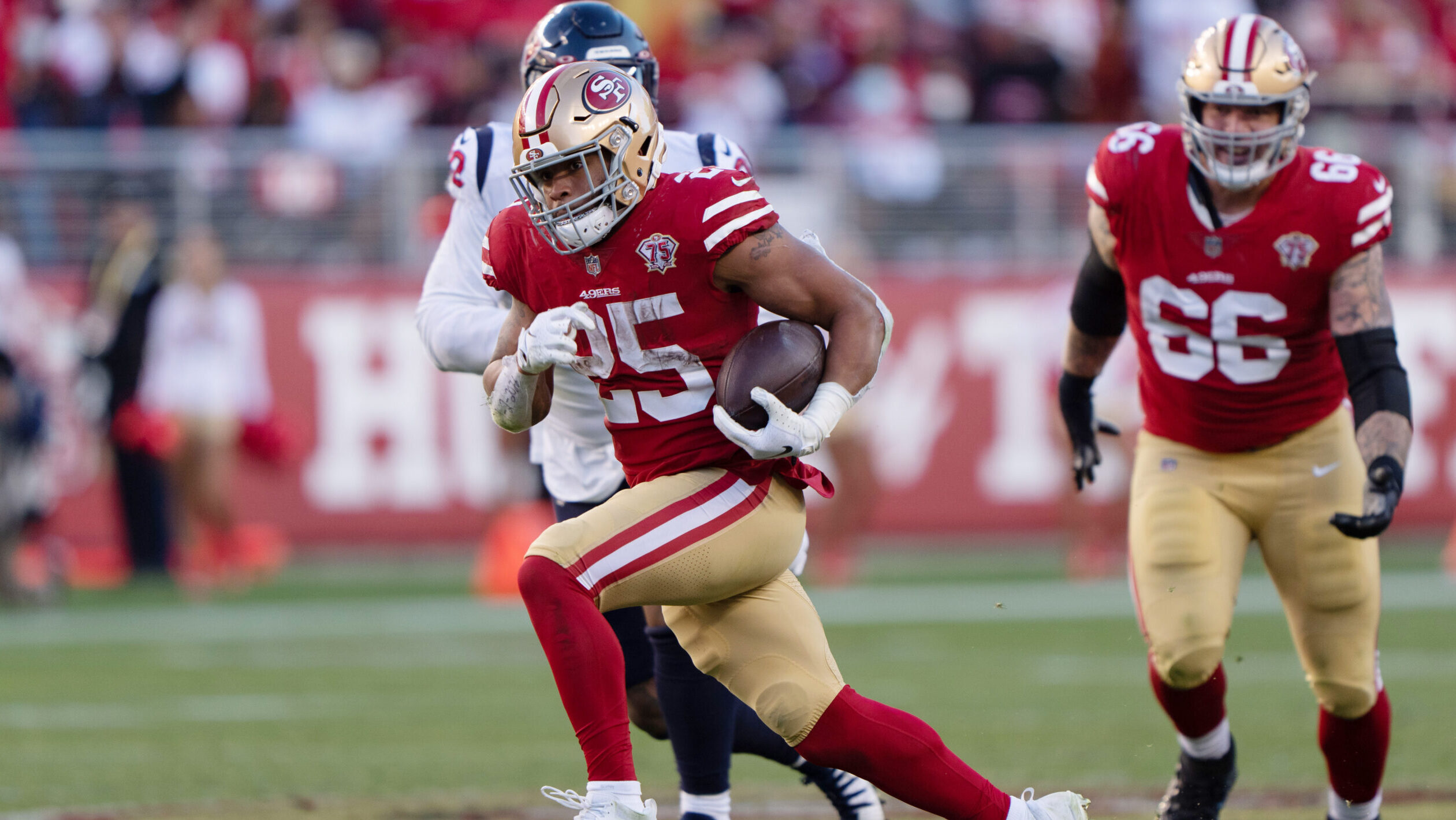The New England Patriots were blown out by the Buffalo Bills 47-17 on Saturday night in the wild-card round of the NFL playoffs. Here's a breakdown of what went wrong for the Patriots in the lopsided loss, which featured the largest margin of defeat of any postseason game in the Bill Belichick era:
1. Their plan against Josh Allen failed spectacularly
All week, the Patriots stressed the importance of not letting Allen beat them with his legs. Matthew Judon talked about it. Adrian Phillips talked about it. Belichick talked about it.
On the very first drive, New England allowed the Buffalo quarterback to scramble for 26 yards, pick up 15 yards on a designed QB sweep on third-and-3 and leave the pocket to buy time -- nine whole seconds of it -- before firing the unlikeliest of touchdown passes to tight end Dawson Knox.
Allen later ran for 5 yards to convert a third-and-4, powered through a Christian Barmore tackle attempt on an 8-yard run and juked reserve cornerback De'Vante Bausby (more on him in a bit) into oblivion on another that gained 9 yards. He finished with 66 yards on six carries, four of which resulted in first downs.
Allen did plenty of damage with his arm, too (21 of 25, 308 yards, five touchdowns, zero turnovers), but his ability to deliver on the exact types of plays New England was focused on stopping underscored just how poor a defensive performance this was.
2. They started slow -- and never woke up
Following the script from their previous three losses, the Patriots again fell behind by double digits in the first half. Only this time, there was no second-half rally. Quarterback Mac Jones led two late touchdown drives, sure. But the Patriots -- who were outscored 52-7 in the first quarter over their final five games -- never came close to catching their AFC East rivals because Buffalo simply never stopped scoring.
The Bills found the end zone on all seven of their possessions, excluding an end-of-game kneeldown. According to Football Perspective, they're the only team in NFL history to go an entire game without a single punt, field goal or turnover.
Safety Devin McCourty summed up that milestone with one word: "Embarrassing."
Two of the worst defensive performances of the Belichick era have come against this same Bills team in the last month. In its Week 16 win at Gillette Stadium, Buffalo reached the red zone on every non-kneeldown drive and never punted, though that game did feature two field goals and one turnover on downs.
The 47 points allowed Saturday night were the second-most ever by a Patriots team in the playoffs, trailing only the franchise's 51-10 loss to the San Diego Chargers in the 1963 AFL championship.
3. They couldn't stop the run
It wasn't just Allen who gashed the Patriots' defense. New England also struggled to contain running back Devin Singletary (16 carries, 81 yards, two touchdowns) and wide receiver Isaiah McKenzie (three carries, 29 yards), both of whom exploited the Patriots' soft defensive edges for big gains. Buffalo ran for 174 yards and averaged 6.0 yards per carry, with New England failing to register a single tackle for loss.
Run defense was a major issue for the Patriots during their late-season downfall. They let up more than 170 yards on the ground in four of their final seven games.
4. They were awful on third down
Belichick said third-down execution on both sides of the ball was the Patriots' "biggest problem" the last time they played the Bills. It was right up there again Saturday night. Buffalo officially went 6-for-7 on third down, but that includes a game-ending knee. The Patriots never stopped Allen in a gotta-have-it situation.
The Bills helped themselves out by never facing a third down longer than 4 yards and often bypassing that down entirely. Allen and Co. moved the chains 29 times and faced just six meaningful third downs -- a testament to their early-down efficiency. Only one Buffalo touchdown drive featured more than one third down.
The Patriots' offense actually was much better on third down than it was in Week 16 (7-for-14 compared to 1-for-10), but it continuously put itself in disadvantageous situations. Jones faced third-and-6 or longer eight times and third-and-10 or longer four times.
5. Buffalo dominated their cornerbacks
Starting cornerback Jalen Mills was unavailable for this game after he tested positive for COVID-19. Given the Patriots' lack of depth at the position, that seemed like a recipe for disaster against a Bills team that features one of the NFL's deepest receiving corps.
It was.
Nearly every available New England corner had at least one glaring lowlight in the loss. Joejuan Williams, who started in place of Mills, allowed a 22-yard completion to Gabriel Davis and later was toasted by Emmanuel Sanders on a 34-yard touchdown. Myles Bryant again struggled to keep up with McKenzie and later surrendered a touchdown to Davis. Both were benched before the end of the first half, then later returned.
Practice squad call-ups Bausby and D'Angelo Ross replaced them and immediately were exposed, with the former getting his ankles broken by Allen and the latter missing Singletary on the touchdown that extended the Bills' lead to 27-0.
Special teamer Justin Bethel was playing in Williams' spot early in the fourth quarter.
Pro Bowler J.C. Jackson wasn't immune to these miscues, either. He also had a shot at Singletary on that touchdown run by never got a hand on him. In coverage, he allowed a 45-yard completion to Stefon Diggs and a 38-yarder to Knox, both of which set up Bills touchdowns.
The Patriots' only pass breakup in the game came courtesy of defensive tackle Lawrence Guy, who swatted down one Allen throw at the line.
There were breakdowns at every level of the Patriots' defense, but these back-end errors spotlighted how precarious the Patriots' cornerback group was this season. They had no quality backups for Jackson or Mills, and Bryant was inconsistent as their Jonathan Jones replacement in the slot.
Bolstering that unit needs to be near the top of the Patriots' offseason priority list. They also need to decide what to do with Jackson, who would be the top corner on the market if he's allowed to hit free agency.
(New England's safeties had big problems in coverage, too. Allen beat Phillips on one touchdown pass and Kyle Dugger on two.)
6. Their pass rush was nonexistent
Did the Patriots' defensive backs struggle? Yes. But they weren't given much help up front. New England finished the game with zero sacks and just one quarterback hit -- by Judon on the final play of Buffalo's opening drive. Allen was largely unbothered all night.
This was the continuation of another troubling trend. In their Week 15 loss to the Indianapolis Colts, the Patriots had one sack (by Deatrich Wise) and no additional QB hits. In Week 16 against Buffalo: no sacks, four QB hits. Against the Miami Dolphins in Week 18, their only QB hit was a Kyle Van Noy sack.
That's two sacks and seven quarterback hits over the Patriots' final four losses. And they were only moderately more disruptive in their Week 17 win over Jacksonville, sacking Trevor Lawrence twice and hitting him three times.
Judon's stats over those five games: zero sacks, one QB hit. The Pro Bowler matched the Belichick-era sack record (12 1/2) in Week 13 but never surpassed it -- a sharp regression for the Patriots' defensive MVP.
7. Turnovers
Jones turned in a solid performance in his postseason debut. He's miles behind Allen at this stage of his career, but he certainly was not the reason the Patriots lost this game in the fashion they did. But his two turnovers snuffed out what little momentum New England was able to generate.
The first was an early turning point: After Buffalo opened with a touchdown, the Patriots responded with a promising drive that featured two third-and-long conversions by Jones. Then, on first-and-10 from the Bills' 34, Jones fired a deep ball to Nelson Agholor that was intercepted in the end zone by safety Micah Hyde.
The highlight-reel pick was a spectacular play by Hyde more than a mistake by Jones, but the result was the same. Buffalo quickly drove for another touchdown to go up 14-0.
Jones did appear to be the one at fault on his second interception, which came on the opening drive of the second half. After a 10-yard screen to Rhamondre Stevenson and a 14-yard run by Damien Harris, the rookie QB tried to force a pass to a tightly covered Hunter Henry that was tipped by a linebacker and picked off.
With the Patriots trailing 27-3 at the time, they needed a touchdown on that drive to have any chance of staging a comeback. Instead, the Bills proceeded to drive 42 yards in seven plays to tack on six more points and essentially put the game away.
The Patriots were 1-6 this season when Jones committed multiple turnovers, which he did in four of their final five games. New England's defense also failed to generate a single takeaway for the third time in the last four weeks.
NESN's New England football takeaways is presented by Valvoline Instant Oil Change



